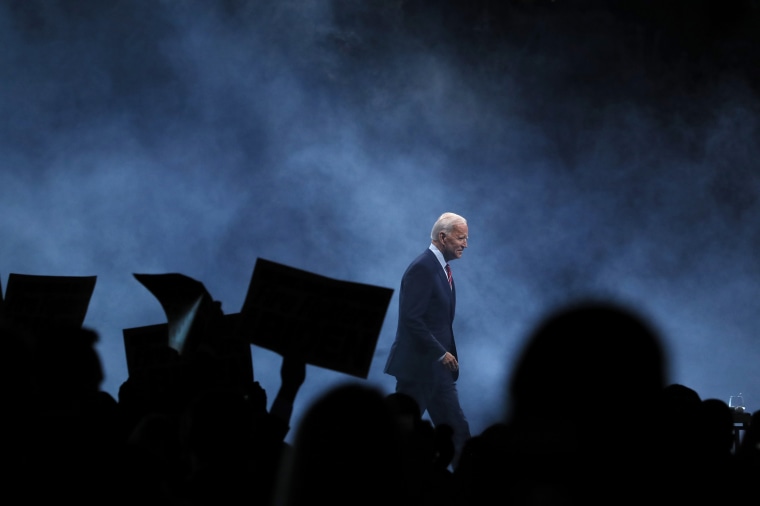WASHINGTON — Joe Biden has defeated Bernie Sanders in the Wisconsin Democratic primary, NBC News projects, the last contest held before the Vermont senator dropped out and endorsed the former vice president.
The results of last week's election, released on a court-ordered delay Monday, cap a highly unusual and controversial election that took place despite the coronavirus pandemic last Tuesday, when voters donned masks and gloves to head to the polls.
With 95 percent of the vote in, Biden has a commanding lead over Sanders of 63.2 percent to 31.3 percent, or 542,536 votes to 268,504 votes. NBC News projects that the lead will translate into a net gain of 30 delegates for Biden over Sanders, bringing his total to 1,273 delegates, to Sanders' 935.
Meanwhile, in a high-stakes battle for the Wisconsin Supreme Court, liberal judge Jill Karofsky defeated conservative incumbent Justice Daniel Kelly, who was backed by President Donald Trump, according to the Associated Press.
While the court is technically non-partisan, Republicans fought to defend the conservative majority on the court, while Democrats backed Karofsky, with both sides hoping to influence the outcome of major voting rights cases before the court in the most important swing state in the country ahead of the November presidential election.
Full coverage of the coronavirus outbreak
Conservatives will still retain the majority on the court, but it will be narrowed to 4-3 and could be a positive sign for Democrats in the bellwether state after the party narrowly lost a 2019 court election.
“This victory comes despite Republicans’ best attempts to steal this election," said Democratic National Committee Chairman Tom Perez. “Republican attempts at voter suppression didn't work in Wisconsin, and Democrats are fighting tooth and nail to ensure they don’t work in November."
The seat was important enough to prompt Trump to weigh in on behalf of Kelly, who conceded in a statement shortly after the race was called.
A federal judge gave the state six extra days to receive and count the unprecedented surge in absentee ballots that voters requested and barred the state from releasing results of the April 7 election until Monday.
Heading into Wisconsin, Biden had already amassed a nearly insurmountable lead in delegates to the Democratic National Convention, which is now scheduled to be held in Milwaukee in August after it was pushed back a month because of the COVID-19 outbreak.
Sanders easily defeated Hillary Clinton in Wisconsin in 2016, but he was trailing Biden in Marquette Law School's final poll before this month's contest.
Sanders dropped out of the Democratic primary campaign the day after Wisconsin's election, staying in long enough to get his supporters to turn out for a key state Supreme Court race, and he endorsed Biden on Monday in a surprise appearance on the former vice president's livestreamed campaign event.
Thanks to those mailed-in-ballots, turnout may actually be on par with that of past elections despite the fear of contagion and a statewide stay-at-home order.
Nearly 1.3 million Wisconsin voters requested absentee ballots, and 1.08 million were returned, according to the Wisconsin Election Commission, compared to a little over 1 million total ballots that were cast (both in-person and as absentees) in the 2016 Democratic primary and the 1.11 million that were cast overall in the 2008 primary.
Historically, just 5 percent or so of Wisconsin voters cast absentee ballots, while the vast majority vote in person, but the ratio may be close to reversed this time.
Also on the ballot are thousands of municipal offices, including the mayor of Milwaukee, which is part of the reason state officials resisted postponing the election, even as every other state that planned to hold elections in April rescheduled.
The Wisconsin race was marred by legal and political disputes after the state's Democratic governor tried to call off the election at the last minute, citing public health, only to be rebuffed by the state's Republican legislative leaders, who won judgments in their favor from the conservative majorities on the Wisconsin and U.S. Supreme Courts.
Download the NBC News app for full coverage and alerts about the coronavirus outbreak
A new controversy has emerged since the election after officials received thousands of mailed-in ballots that may not be counted because the Postal Service did not give them dated postmarks.
State law has no postmark requirement, but the U.S. Supreme Court added one by requiring that ballots be postmarked by Election Day to be counted. Democrats on the state Election Commission pushed to count those ballots, but Republicans said their hands were tied by the ruling.
Now, however, the state is preparing for another round of partisan battles over an election as Democrats call for postponing or switching primarily to vote-by-mail for a special congressional election scheduled for May 12.

